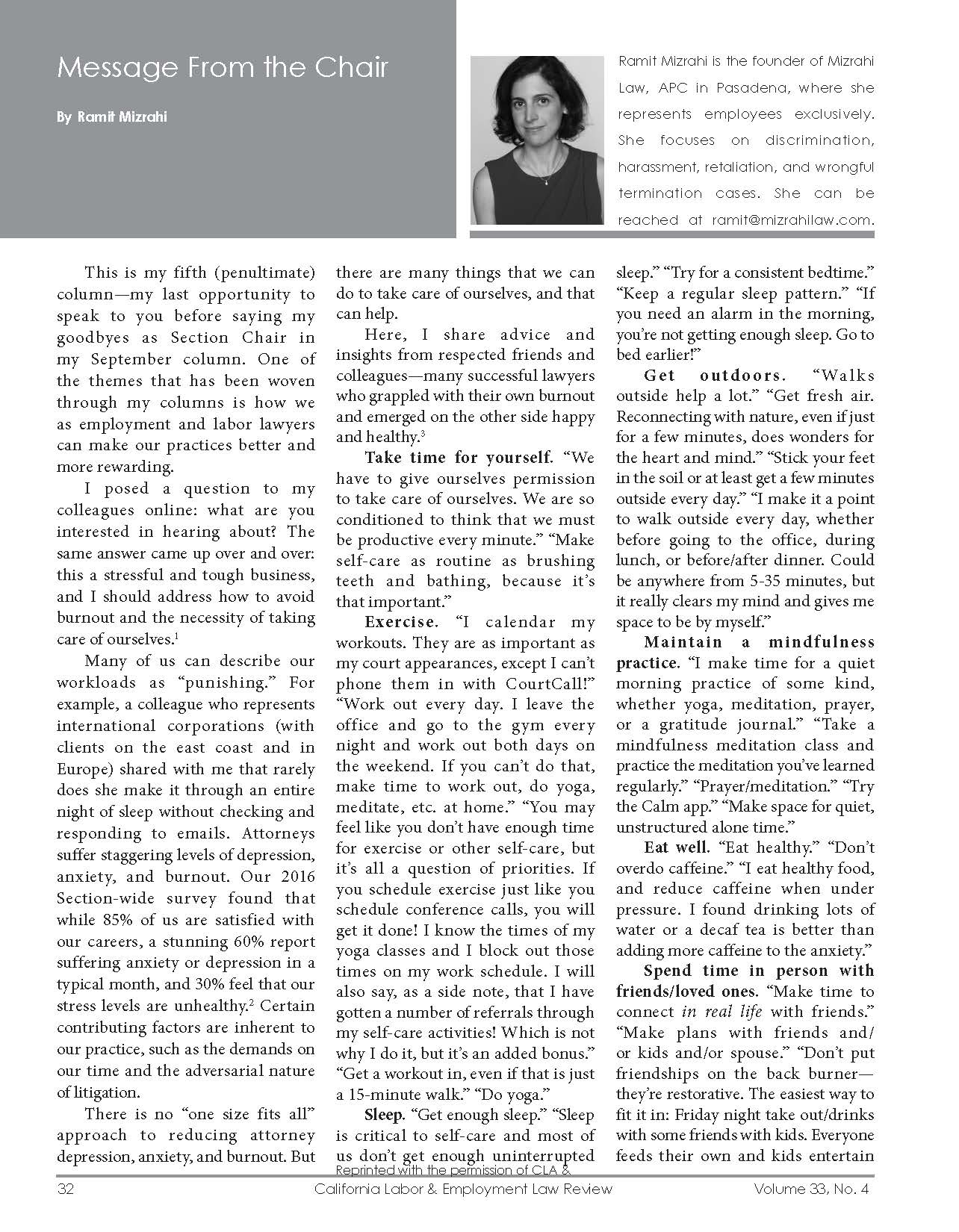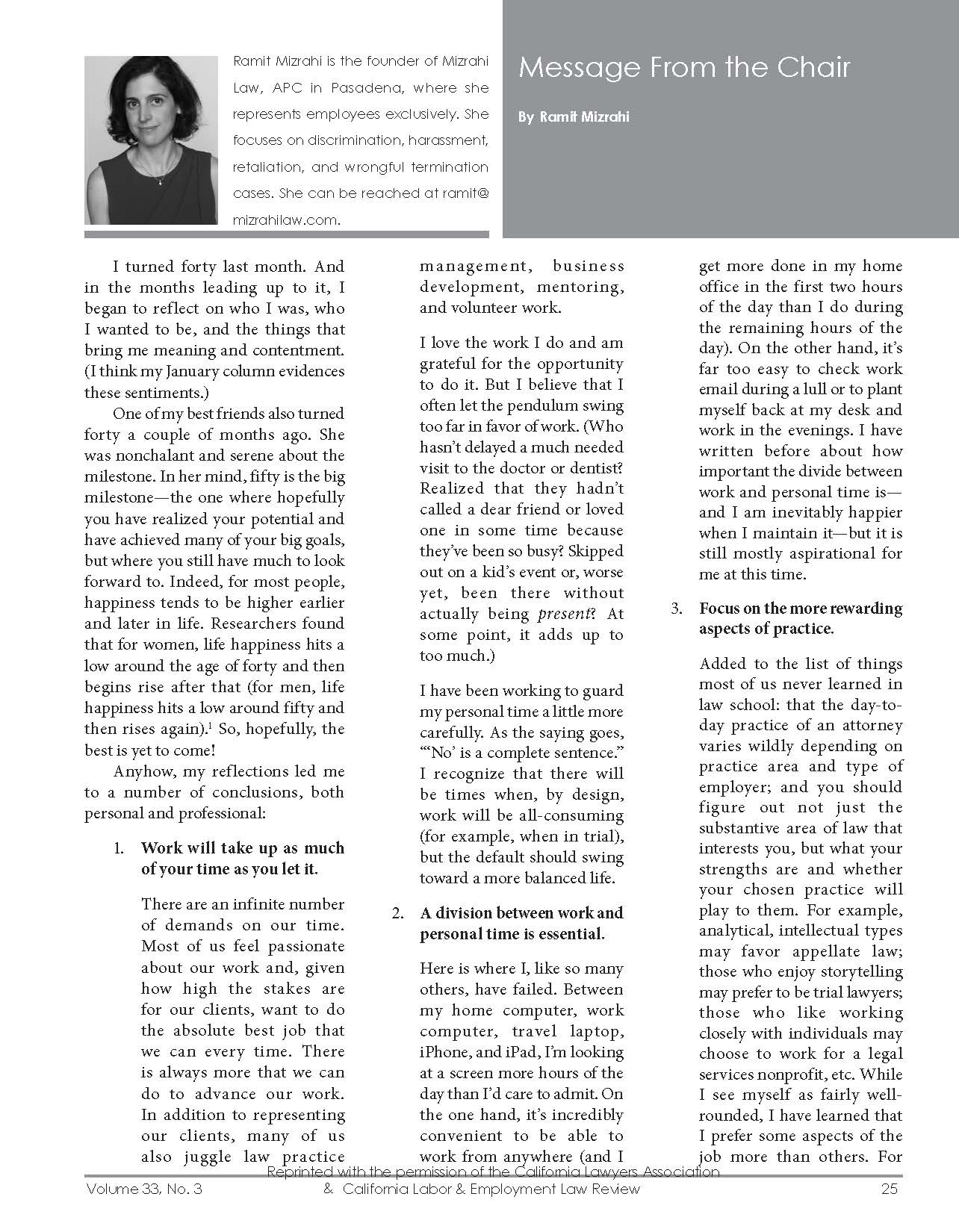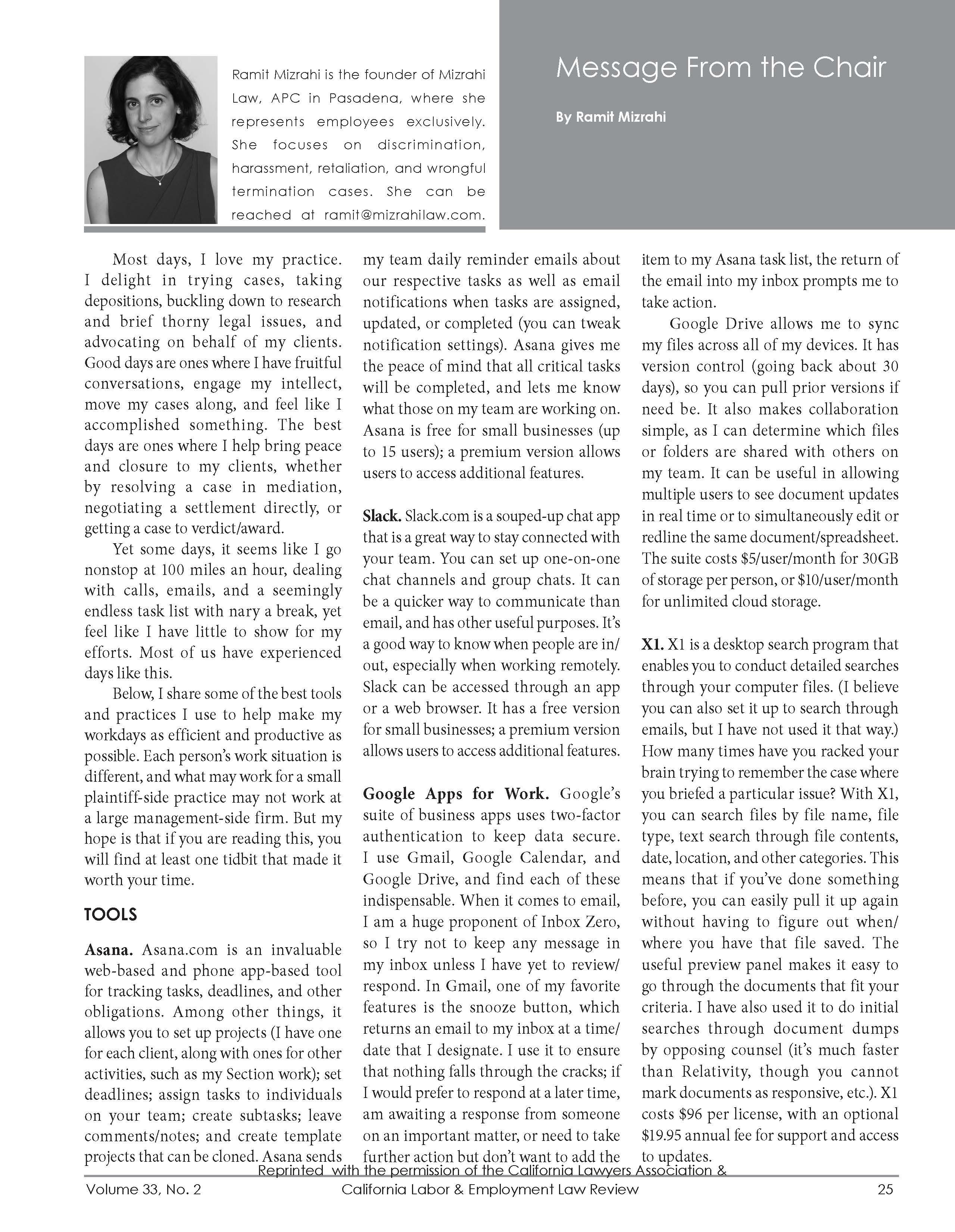-

On October 12, 2019, Ramit Mizrahi will be presenting at the California Lawyers Association’s 2019 Annual Meeting. She will be providing a California employment law legislative update, covering the new laws passed this year.
Date and time: October 12, 2019, 8:45 a.m. – 9:45 a.m.
Location: Monterey Conference Center, Portola Hotel & Spa at Monterey Bay, CA
Additional information can be found on the CLA 2019 Annual Meeting page.
-

Ramit Mizrahi has been recognized in U.S News & World Report’s 2020 Edition of The Best Lawyers in America© for her work in employment law representing individuals.
Ms. Mizrahi has also been selected to the 2020 Southern California Super Lawyers® list, again for her work in employment law representing individuals.
Both honors reflect peer recognition of excellence in practice.
This marks the eighth year that Ms. Mizrahi has been recognized by Super Lawyers®, including having previously been distinguished as being among the top 100 Rising Stars and top 50 Rising Stars women for three consecutive years.
Ms. Mizrahi and the Mizrahi Law team remain committed to serving as tenacious advocates for the firm’s clients while working to build collegiality and community in the legal profession.
-

On August 7, 2019, Ramit Mizrahi appeared on AirTalk (guest hosted by Libby Denkmann) at KPCC to discuss pregnancy discrimination and retaliation in the workplace. The primary topic was the memo by a former Google manager that has since gone viral; the show also welcomed guest callers to speak about their own experiences.The episode can be found here: Another Google Employee Memo Has Gone Viral, This Time Alleging Discrimination Against Pregnant Women. Ramit can be heard starting at 9:33.
-
The July 2019 issue of the California Lawyers Association’s Labor & Employment Law Review featured Ramit Mizrahi’s fifth message as Chair of the Labor and Employment Law Section.
In her column, Ramit shares insights on how attorneys can avoid burnout and thrive while engaging in demanding careers. Click on the below image to read the article in full.
-
Senate Bill 707 is directed at employers who force employees into arbitration then refuse to pay the fees

On May 28, 2019, the California Senate passed Senate Bill 707 (“SB 707”), otherwise referred to as the Forced Arbitration Accountability Act. SB 707 seeks to end an abusive tactic that employers use to deny their employees justice—forcing them to arbitrate their legal claims and then suspending the process by refusing to pay the arbitration fees. The bill would pull employees out of this legal limbo by giving them options that allow them to proceed with their cases despite employer non-cooperation. SB 707 also aims to examine the alarming lack of diversity in the arbitration industry. It would require arbitration service providers to collect and share demographic data about the self-reported ethnicity, race, disability, veteran status, gender, gender identity, and sexual orientation of all arbitrators, as California judges are required to do.
1. OVERVIEW OF ARBITRATION
To understand the potential impact of SB 707, it is helpful to start with an overview of arbitration.
Arbitration is a form of private dispute resolution that takes place outside of the court system. In arbitration, an arbitrator—often a retired judge or lawyer—acts as both the judge and jury and renders a decision, which is generally final and binding. Employers are increasingly requiring employees to sign arbitration agreements and waive their right to a jury trial as a condition of employment. According to estimates from the Economic Policy Institute and the Center for Popular Democracy, almost 83% or 95 million of the country’s private, non-unionized employees will be subject to arbitration by 2024. These arbitration agreements are often buried in the fine print of job applications, employment agreements, or employee handbooks, and employees often only learn that they have signed arbitration agreements after-the-fact.
Arbitration generally favors employers. When employees are forced into arbitration, they are less likely to win their claims, and even when they do, they receive lower awards that employees who had jury trials.
One reason for this is that employers get to choose the rules governing the proceedings. The rules often make the process less favorable to employees, including by restricting discovery, limiting appeal rights, and prohibiting class actions. Discovery is the process by which each side formally obtains information from the other, including depositions (in which a party’s lawyer can examine witnesses under oath), interrogatories (written questions), requests for admissions, and requests for production of documents. In cases where an employee must prove that an employer acted with wrongful intent or discriminatory bias, the lack of meaningful discovery (for example, being denied the ability to take a sufficient number of depositions) can be fatal to an employee’s claim. (In some states, employers also use the rules to shorten the time that employees have to file their statutory claims (the statute of limitations) and to restrict legal remedies; this is not permissible in California.)
Another reason that the process favors employers is that . . .
-
The May 2019 issue of the California Lawyers Association’s Labor & Employment Law Review featured Ramit Mizrahi’s fourth message as Chair of the Labor and Employment Law Section.
In her column, Ramit shares her insights on how to make the practice of law (and life) more rewarding. Click on the below image to read the article in full.
-

On July 19, 2019, Ramit Mizrahi will be moderating a panel at the California Lawyers Association’s 36th Labor & Employment Law Section Annual Meeting.
Title: The Secret of My Success: Insights from Top Trial Lawyers
Date and time: Friday, July 19, 2019, 4:00 p.m. – 5:30 p.m.
Location: Millennium Biltmore Hotel, 506 S. Grand Ave., Los Angeles, CA 90071
Description: Some plaintiff-side employment attorneys routinely score seven-figure verdicts, while some management attorneys regularly obtain defense verdicts. How do they do it? You’ll find out in this seminar, where four ace trial lawyers will discuss how they work and will share some of the lessons they have learned from experience. This will not be your typical success stories panel, as we hope you will take away ideas that will help you in your next trial.
Additional information can be found on the CLA website, here.
-
Senate Bill 135 could expand family and medical leave protections to many more California employees

UPDATE: On May 30, 2019, SB 135 was ordered to the inactive file at the request of Senator Jackson. However, several of the changes proposed in the bill were subsequently adopted during the following legislative session as part of Senate Bill 1383, which became effective on January 1, 2021. Among other things, SB 1383 expanded CFRA to:
- Apply to employees at workplaces with 5 or more employees (down from 50);
- Allow leave to care for grandparents, grandchildren, siblings, domestic partners, children of domestic partners, and adult children (in addition to care for parents, children, and spouses, which was already covered);
- Allow leave in some circumstances where an employee’s spouse, domestic partner, child, or parent is serving in active duty in the Armed Forces of the United States.
See our post on Senate Bill 1383 here.
On January 15, 2019, Senator Hannah-Beth Jackson of California’s 19th District introduced Senate Bill 135 (“SB 135”). The bill seeks to significantly expand California workers’ access to job-protected, paid family and medical leave by extending coverage under the California Family Rights Act and California’s Paid Family Leave program. The legislation follows Governor Gavin Newsom’s recent announcement that he is committed to expanding paid family leave.
Senator Jackson introduced SB 135 with four main goals:
- Ensuring that all workers have job protection when they take paid family leave.
- Extending the time period workers can take paid family leave to care for an ill family member and so that every newborn can be cared for by a parent or close family member for their first six months of life.
- Expanding and harmonizing the definition of family member in our family leave laws to reflect the realities of today’s working families.
- Increasing the wage replacement amount to ensure families can afford to take leave.
1. OVERVIEW OF EXISTING PROTECTIONS
To understand the potential impact of SB 135, it is helpful to start with an overview of California’s existing family and medical leave laws.
The Pregnancy Disability Leave Law (“PDLL”) allows employees to take up to four months of unpaid, job-protected leave for pregnancy, childbirth, or related conditions. The law covers all employees at companies with five or more employees; employees are covered from their first. . .
-

On March 26, 2019, Ramit Mizrahi appeared on AirTalk (hosted by Larry Mantle) at KPCC to discuss the importance of SB 188, the CROWN Act.
The CROWN Act will prohibit workplace discrimination against employees who wear their hair in braids, locks, twists, and other protective hairstyles. It will prevent employers from enforcing seemingly “race neutral” grooming policies that prevent people of color from growing their naturally textured or curly hair or wearing it in certain hairstyles.
The CROWN Act will do so by amending the California Fair Employment and Housing Act (specifically, Government Code § 12926) to add the following definitions:
(w) “Race” is inclusive of traits historically associated with race, including, but not limited to, hair texture and protective hairstyles.
(x) “Protective hairstyles” includes, but is not limited to, such hairstyles as braids, locks, and twists.
The episode can be found here: Braids, locs and twists: new CA bill aims to protect certain hairstyles from workplace discrimination.
-
The March 2019 issue of the California Lawyers Association’s Labor & Employment Law Review featured Ramit Mizrahi’s third message as Chair of the Labor and Employment Law Section.
In her column, Ramit shares the tools and practices she uses to run an efficient law practice. Click on the below image to read the article in full.
News
Mizrahi Law, APC
- 35 N Lake Ave, Ste 710, Pasadena, California 91101
- dates@mizrahilaw.com
- (626) 380-9000
Client Testimonial
“I highly recommend Ramit Mizrahi. She has a winning combination of knowledge, passion, strategy, and empathy. She takes action and communicates updates promptly. Her professionalism is hard to beat. I’d give her 10 stars if I could!”
Latest News
- Ramit Mizrahi has been recognized as one of the Top 100 Super Lawyers and Top 50 Women Super Lawyers in Southern California in 2023.
- Ms. Mizrahi is being recognized in the 2023 Edition of The Best Lawyers in America©, published by U.S. News & World Report and by Best Lawyers.
- Ms. Mizrahi has been selected as a Top Attorney by Pasadena Magazine for 2023.
- Ms. Mizrahi is serving as Chair of the Pasadena Bar Association Labor and Employment Section.



